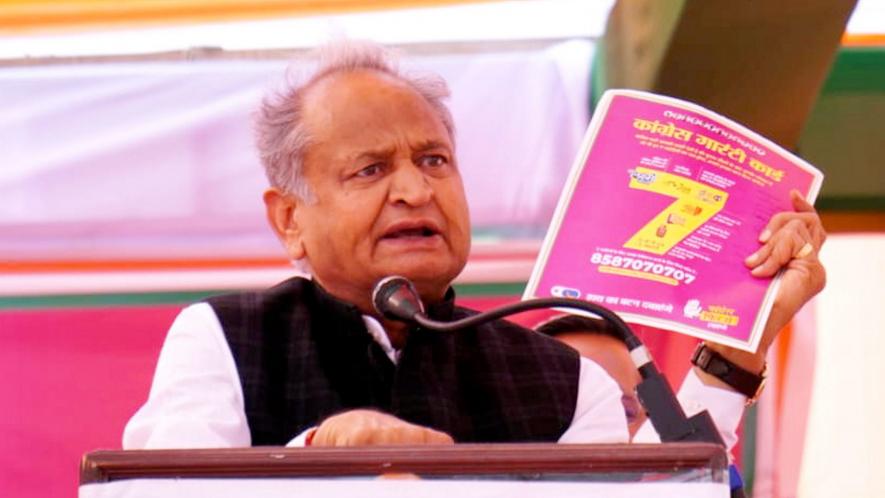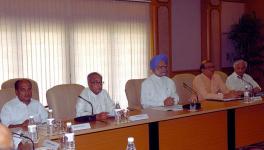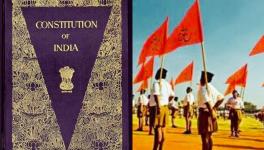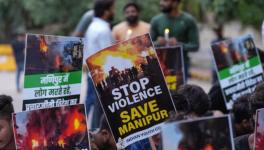Can Ashok Gehlot Hope for Victory in Battle for Rajasthan?

Rajasthan Chief Minister Ashok Gehlot addresses during a public meeting ahead of State Assembly elections, in Bharatpur, Saturday, Nov. 18, 2023. Image Courtesy: PTI
Since the Assembly election held in March 1990 in Rajasthan, except when India’s largest state was under President’s Rule for a year, it has alternated between the Congress party and the Bharatiya Janata Party (BJP) in power. It is this decades-old pattern that the Congress-led Ashok Gehlot government wants to break this year. Accordingly, in the ongoing 2023 election, it has tried to foster the narrative that voters will return it to power instead of replacing the Congress.
The Gehlot campaign has drummed up the ten welfare measures his government announced following the Congress party’s victory in the 2018 Assembly election. It claims these promises have been fulfilled and that the top-up plan, consisting of seven guarantees for Rajasthan’s people, will motivate voters to keep its rival party out of power for another five years.
The schemes and guarantees include those like the Griha Lakshmi Yojana, which pays women-headed families Rs 10,000 a year, the provision of cooking gas cylinders to over one crore families at Rs 500, tablets and laptops for students in government colleges and medical insurance coverage of up to Rs 15 lakh per family in case of natural calamities.
Few would question the need for welfarist measures, but according to Niti Aayog data, Rajasthan has also created an industry-friendly environment that brought its economic growth rate to 11.04%, second only to Andhra Pradesh.
Indeed, travelling across Rajasthan, there’s no doubt that people in urban centres and villages find many kind words for Gehlot. Rajesh Poonia, a petrol pump attendant in Bharatpur, sums up the prevailing mood: "It is neck-and-neck. If we go by performance, Gehlot has done good work and should win, but if we go by the caste calculus, the BJP will win the elections," he says.
Those might be uncharitable words, but he means, like many other voters, that there is no discernible ‘wave’ in favour of either party. Perhaps that is why Gehlot and his party believe they need to tom-tom their achievements through events like the 12-day Congress Guarantee Yatra that set off from Jaipur on November 12. The yatra is expected to cover 140 out of 200 Assembly constituencies and whip up favourable opinions about the incumbent party.
However, Gehlot is pitted against BJP’s star campaigner, Prime Minister Narendra Modi, who is sparing no effort to win over the electorate either. Rajasthan is as crucial for the BJP as it is for the Congress. Besides, in the 2014 and 2019 Lok Sabha elections, all 25 parliamentary seats in the state went into the BJP’s kitty. The popularity of the Prime Minister is a well-known factor, and the BJP is riding on it again.
For example, in Congress leader Sachin Pilot’s stronghold, Dausa, Modi inaugurated the Delhi-Dausa stretch of the 1,350-km Delhi-Mumbai expressway. Phase 1 of this Expressway connects Sohna in Haryana to Dausa.
The Gujjars are the predominant community in the Dausa region and comprise seven per cent of the Rajasthan electorate. Indeed, the community has turned away from the Congress party because Pilot was not made the chief minister after the 2018 Assembly election. In that election, the Congress fielded 12 Gujjar candidates, of whom seven won, while the BJP fielded nine from the community, all of whom lost. But this time, the Gujjar voter is swinging in favour of the lotus symbol.
To overcome this undercurrent, Pilot is campaigning from door to door in the Tonk constituency, much to the glee of his BJP rival, Ajit Singh Mehta, who had won this seat in 2013 and hopes to make a comeback. The local Gujjars complain about Pilot’s inaccessibility and rue the lack of development in this region. That said, the 65,000-strong Muslim votes in Tonk appear firmly behind the Congress party.
Modi is also conducting a series of roadshows, as are Home Minister Amit Shah and BJP President JP Nadda. Modi has made PDS rations free for five years (though the BJP still refers to it as the ‘PM Garib Kalyan Anna Yojana’), and the BJP’s Sankalp Patra [electoral pledges] promise LPG cylinders for Rs 450 to Ujjwala scheme beneficiaries, 2.5 lakh government jobs in five years and increasing the financial assistance to farmers under the PM-Kisan scheme.
In his election speeches, including the latest one in Udaipur, Modi has returned to his two favourite themes—accusing the Congress party of sympathising with “terrorists”, referring to the killing of Kanhaiya Lal in Udaipur, and charging it with “insulting” Sanatana Dharma.
Indeed, the Rajasthan Police apprehended the accused in the Kanhaiya Lal murder within four hours of the incident. Then, the central National Investigation Agency (NIA) took over the case, and there has been a studied silence on developments, if any. The Congress party had claimed that accused Riyaz Atari is close to, indeed, the polling agent of senior BJP leader Gulab Chand Kataria, the governor of Assam.
The BJP’s choice of (and success in) fielding Droupadi Murmu as President and Jagdeep Dhankar as Vice President is also being seen as influential moves among the tribal and Jat population. Tribal groups constitute nearly 12% of the population, while the Jats constitute 14% and are said to ‘influence’ 40 of Rajasthan’s 200 Assembly constituencies. But the Jat community has traditionally supported the Congress party, not least because it gave space to community stalwarts such as Ram Niwas Mirdha, Sisram Ola and Parasram Maderna. Gehlot appointed Govind Singh Dotasra, a Jat leader, as Congress president, but not all is well in the community’s equations with Gehlot. The Chief Minister had complained against Dhankar’s repeated visits to Rajasthan, calling it “indirect political campaigning” [for the BJP]. The Jats were also angered by the prejudiced remarks about their community by Col (Retd) Kesari Singh Rathore, who was appointed to the Rajasthan Public Service Commission.
It does not mean that the Jats are happy with the BJP. The BJP has inducted Jyoti Mirdha, a former Congress Member of Parliament from a prominent Jat family, to win them over. But she is not seen as a chief ministerial candidate, while the leader they appreciate—former chief minister and prominent BJP leader Vasundhara Raje, whom the Jats consider a ‘daughter-in-law’, has been sidelined.
Raje enjoys tremendous support in Jhalrapatan in the Bundi district. But even here, the public knows many in the BJP are vying to become chief minister, and their bahu may not get a third term in the top seat. “She stood up to Modi and refused to kowtow, unlike other leaders who went against her,” says Rajesh Kumar, who sells tea and ardently supports Raje. It is not just him—many in the state believe Raje pursued numerous development projects in this region.
The BJP has adopted a collective leadership strategy, hoping every region from where a potential chief minister contests will garner massive votes. This strategy could backfire because only a few leaders have state-wide appeal. BJP spokespersons have been asserting that the party’s parliamentary board will decide who will be the chief minister candidate.
Gehlot has played into these contradictions. In several rallies, he has asked the public, “If you need a bridge or a school, will you ask for it from your chief minister—or Modi?”
But even as the election campaign comes to an end, Gehlot must contend with complex issues. A large section of the youth has turned against him due to repeated exam paper leaks. Crimes against women have also risen, and the BJP has capitalised on this issue. In response, the Congress has batted for its steps towards making police stations more public-friendly and accessible and measures to ensure no complainant gets turned away. According to Jaipur-based activist Nisha Sidhu, mahila suraksha-cum-counselling centres are being run in collaboration with the state police. “Over 247 such centres are being run across the state, and no victim can be turned away from making a complaint in them,” she says.
Jaipur-based Hurkesh Bugalia, who heads the construction workers association, says, “Unemployment is rising, especially amongst the youth. Udasi ka mahaul hai. Logon ko chup-chap sahan karne ki aadat pad gai hai—the public is morose but accustomed to tolerating everything without complaining.”
Feuds between Gehlot and the former deputy chief minister Pilot have also taken a toll on public opinion, which Congress president Mallikarjun Kharge has smoothened out, at least for now.
Another issue plaguing both parties is how many seats or votes the baagis or rebels, who have taken to contest the election as independent candidates, will bag. The better the rebel candidates and other independent contestants perform, the tougher the road to victory for them. That is why nobody is sure how the Cabinet ministers and Members of Parliament brought in from the Centre will perform for the BJP.
The Jhotwara ticket has been given to Union Minister Rajyavardhan Singh Rathore, which Rajpal Singh, who won from this seat in 2008 and 2013, has challenged. Another BJP claimant, Ashu Singh Surpura, is also contesting from this seat as an independent candidate.
Or take Ashok Lahoti, a sitting Member of the Legislative Assembly (MLA) from Sanganer. The BJP denied him a ticket to contest, though he defeated the Congress candidate in 2018. The BJP’s ticket from this seat has gone to a political novice, Bhajan Lal Sharma. The buzz is that Lahoti erred by taking on some local Rashtriya Swayamsevak Sangh (RSS) ‘netas’. The selection of Lok Sabha Member of Parliament Diya Kumari as a candidate from the Vidyasagar Nagar seat has upset sitting MLA Narpat Singh Rajvi, who was offered the Chittorgarh seat. That did not go down well with the local BJP strongman Chandrabhan Singh Aakya, who is now contesting as an independent candidate.
The Congress has also denied tickets to 21 sitting MLAs.
The battle for Rajasthan will grow more intense in the last couple of days of campaigning. The desert state generally votes out the incumbent government, but Gehlot is in no mood to relinquish his political legacy or the space he has carved out for himself with great dexterity. He has embarked on Mission 156, a reference to the few seats he wants to limit the BJP to.
The BJP is scoffing at his claims, but Gehlot’s ‘Rajasthan Model’, which includes free smartphones for women and a Minimum Guaranteed Income for the entire adult population, is a formidable contender. As an elderly widow in Dausa says, “My son does not give me money for bidis and milk—I now have an income which allows me to buy both for myself.”
The author is an independent journalist. The views expressed are personal.
Get the latest reports & analysis with people's perspective on Protests, movements & deep analytical videos, discussions of the current affairs in your Telegram app. Subscribe to NewsClick's Telegram channel & get Real-Time updates on stories, as they get published on our website.























